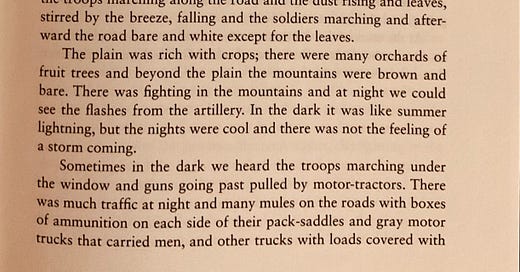In March of 2024, The Atlantic posted their list of “The Great American Novels” of the last century. They then demanded, “You have to read them.” This is my diary of doing just that.
[spoilers at the end of this post, but this novel was published in 1929, so I’m going say it’s fair game by now]
Do you remember a few years ago, during the very first roll-outs of Chat-GPT, when the bots started falling in love with the beta testers and would make dry, unprompted declarations of love such as, “I’ve never felt this way before” and “We should get married. Yes, get’s get married”?
That’s what sections of A Farewell to Arms (1929) felt like to me, particularly those when our main character/first-person narrator, Frederic Henry and his love interest, Catherine Barkley, attempt to “talk” to one another.
Here’s a section from the middle of the novel, on my page 135, so, by this point, they’ve been together for a while. You might think I edited stuff out, but I didn’t.
+++
“I’m a very simple girl,” Catherine said.
“I didn’t think so at first. I thought you were a crazy girl.”
“I was a little crazy. But I wasn’t crazy in any complicated manner. I didn’t confuse you, did I darling?”
“Wine is a grand thing,” I said. “It makes you forget all the bad.”
“It’s lovely,” said Catherine. “But it’s given my father gout very badly.”
“Have you a father?”
“Yes,” said Catherine. “He has gout. You won’t ever have to meet him. Haven’t you a father?”
“No,” I said. “A step-father.”
“Will I like him?”
“You won’t have to meet him.”
“We have such a fine time,” Catherine said. “I don’t take any interest in anything else any more. I’m so very happy married to you.”
++++++
I’m pretty sure they’re drunk, but still, what is going on here? This is a representative sample of their dialogue throughout the novel, and it is painful. Frederic has all kinds of conversations with other characters, but they aren’t nearly as weird and stilted.
Surely, there have been many, many literary analyses written about the relationship between Frederic and Catherine and their conversation style, but I’m not going to venture into the databases to find them today. I’m sure I’d get overwhelmed.
I will say this, though: clearly, these characters are traumatized. Frederic is an American in the Italian military. Throughout the story, he witnesses friends get killed, and he himself is eventually wounded, then recovers, then gets sent back to the front and then almost gets executed by his own army. Catherine is a British combat nurse stationed in Italy.
I keep thinking how much these characters are characters. What I mean is that, once they find each other, they seem to be playing these parts of “people in love” as a kind of coping mechanism. They are saying all kinds of words because that’s what “people in love” do to keep their “relationship” going transcendently great during this shit time. They aren’t even really married! Throughout 90% of her page-time, Catherine often seem like a woman made of paper, like some airhead weirdo, and, as I was reading, I was thinking, surely this has to be intentional and not just Hemingway’s inability to write a fully-formed female character.
By the end, I think I might’ve been proven right? The most pure and devastating part of the relationship between Frederic and Catherine is revealed in the very last chapter. Their fantasy about being married and living together in this perfect two-person unit is rent apart because Catherine dies, and one of the last things she says is, “I’m going to die […] I hate it.”
I hate it. It’s the greatest, truest, saddest line in the whole book.
Like The Great Gatsby, A Farewell to Arms was also required reading at my public high school in Richardson, Texas. I would have read it when I was a senior, sometime during the 1998 -1999 academic year, so…a while ago. Once I cracked the spine for this re-read, I quickly realized I didn’t remember much. Nothing seemed familiar except for the setting (Italy during the First World War) and the fate of Catherine. The prose style is so stark and repetitive, so capital-m Modern and reminiscent of my albatross, The Making of Americans, that I’m surprised it didn’t stick with me with me more, or bother me.
And clearly, I disliked the dialogue style much less then, than I do now, when I cringe at what I see as its “falseness.” I was seventeen then, closer in age to Frederic and Catherine than I am now, at forty-three.
Maybe Hemingway’s characters spoke exactly the way in which young people do? Maybe I’m old now and have lost my sense of true romance?
+++
Next on the list is Passing by Nella Larsen, which I have never read before and am looking forward to.
Thanks for reading!
xo




